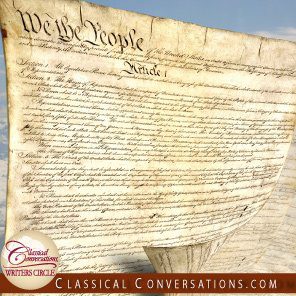Today is September 17. How many of you knew today is Constitution Day in the United States? Robert Byrd, a Senator who hailed from West Virginia, established the day as a Federal observance in 2004. September 17th was chosen because it is the day the Constitutional Convention signed the Constitution in 1787. In fact, today marks the 226th anniversary of that momentous signing.
The Constitution is an exciting part of your child’s education for a variety of reasons. First, information such as that discussed above becomes a part of your child’s memory pegs, upon which he can attach additional information. The Foundations child will remember this as one of the historic events in his Classical Acts and Facts History Timeline cards.
Second, Patrick Henry described the Constitutional Convention as an event at which he “smell[ed] a rat.” What did he mean by that statement? Since education that is contextual and prescriptive provides the best education, you can ask prescriptive questions about the Constitutional Convention. Should the United States have called a Constitutional Convention? Should the United States have replaced the Articles of Convention with the Constitution? Should Patrick Henry have refused to attend the Convention? Should Patrick Henry have fought to have the Bill of Rights amended to the Constitution? These are the sorts of questions that can engender an excitement about an event like the Constitutional Convention, especially among dialectic- and rhetoric-aged students.
Third, the Constitution is an authority to which we can appeal in political conversations and debates. Today is a great day to initiate conversations along those lines. Ask your children questions, perhaps a current events question such as “Should the National Security Administration be accessing the personal, cellular data of American citizens?” What does the Constitution say about this? What is the purpose of the Fourth Amendment? Why was the Fourth Amendment included initially, and what impact does that have on its use today? Does an event like the terrorist attacks on 9/11 change the meaning or application of the Fourth Amendment today? Should it?
Fourth and in order to prevent unnecessary presuppositions, it can be valuable to ask whether the Constitution should be an authority to which we appeal in political conversations and debates. Should we appeal to the Constitution? Why do we appeal to the Constitution instead of another document, such as the Articles of Confederation, the Magna Carta, or the Bible? What if the Constitution and the Bible disagree? Do they?
The grammar-aged child would do well to memorize historical information like the date of the Constitutional Convention, the ratifiers of the Constitution, the preamble to the Constitution, and the Bill of Rights.
The dialectic-aged child would do well to ask questions related to current events, considering the Constitution as an authority to those questions. It is a necessary part of establishing their American cultural identity to know the foundation of the American experiment.
The rhetoric-aged students would do well to stretch themselves and ask harder questions about the Constitution. They should willingly engage Patrick Henry’s viewpoint as well as the objections of the Anti-Federalists and compare them to the Federalists and James Madison. What are the biblical arguments for and against the Constitution? Wrestling dialectically with both sides of the Constitution will strengthen their understanding of America and her history.
Today is a great day to think about the Constitution. It is a day that students and children of all ages can contemplatively consider the history that heavily defines their American identity and why. Hopefully, this has given us some ideas regarding the conversations we might have. For further consideration, a resource like How to Read the Federalist Papers can serve the older students and parents well.




